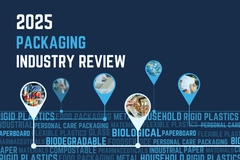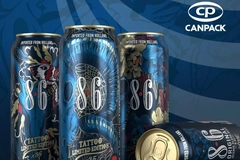50 Years Of Erca – FFS Inventor Celebrates Its Anniversary
12 Oct 2015

IMA Erca, the creator of form, fill and seal technology (FFS), is celebrating its 50th anniversary this year. Much has happened in the packaging machinery industry over that past half century – here’s a look back.
IMA Erca, the creator of form, fill and seal technology (FFS), is celebrating its 50th anniversary this year. Much has happened in the packaging machinery industry over that past half century – here’s a look back.
Fifty years ago, the “Form-Fill-Seal“ concept developed by IMA Erca marked the dawn of a new era in the packaging machinery industry. It dramatically simplified the entire production process for packing liquid and pasty foods: Now a single machine could be used to form cups of different sizes from plastic film, fill them with yogurt, sour cream or similar products, and seal them immediately. Moreover, the FFS concept made it possible to achieve higher standards of hygiene than had been the case with pre-formed cups. And it also reduced material and energy costs – saving as much as 60%, depending on the product.
In the years that followed, FFS technology continued to inspire a whole series of innovations. In 1966, IMA Erca developed the first cup with an interior label for Gervais “Petit Suisse” yogurt. In 1970, the company introduced the PPN Composite Cup for improved labeling. During this cup’s forming process, the label was drawn at the same time and perfectly matched to the individual shape of the cup. The FFS system with “Open Mold” technology for the production of thermoformed containers with and without labeling followed in 1980. This new system significantly reduced trim waste and enabled additional cost savings in the use of materials.
Keeping costs under control
One of the more recent examples of innovation is the “EF 400” with inline fruit feed. Launched on the market in 2010, this FFS machine minimizes fruit loss. The investment costs for this machine can be amortized in less than two years. At 300 production days per year with 10 daily product changes, for example, the EF 400 saves approximately 180,000 kilograms of fruit mixture – the machine pays for itself in 21 months.
IMA Erca unveiled another minor revolution at the industrial trade fair “interpack 2014”: Since that time, the previously established “M-F 14” multipack FFS machine can also produce cups made of polypropylene (PP). Not only does this reduce costs, it offers the advantage that individual cups are significantly more robust and the multipacks can be separated more easily. The PP option can be seamlessly integrated into existing M-F 14 machines.
Meanwhile, IMA Erca is filling more than just food: The “EF 600” form, fill and seal machine produces and fills transparent cups with mineral water, for example. The EF 600 manufactures up to 27,000 cups per hour with filling quantities of 100, 125, 200 or 250 ml. It uses APET material, or amorphous polyethylene terephthalate. This material is transparent like glass, but not nearly as heavy. At the same time, the amorphous structure makes them easy to grip, without the cups “buckling” when used for drinking.
Environmental protection and award-winning innovation
One of IMA Erca’s other core concerns has always been environmental protection. That’s why the company provides its customers with biodegradable packaging materials that minimize the use of raw materials. Take the renewable material “PLA” for example: It can be composted and then disintegrates into the natural components of carbon and water, thus providing for a positive energy balance. PLA is compatible with all dairy products and preserves the taste and flavor of the products. In addition, IMA Erca relies on mono-material packaging, which simplifies recycling, because cup, lid and label are all made of the same material. Moreover, all IMA Erca machines are available in three different hygiene levels – “clean”, “ultra-clean“ and “aseptic” – depending on product requirements and shelf life.
Since its foundation in 1965, IMA Erca’s innovative force has helped it to become the world’s leading supplier of form, fill and seal machinery. Today some 2,000 machines all over the world are supporting major international food and beverage corporations with efficient thermoforming solutions and pioneering cup formats. That performance has also earned IMA Erca several awards, including the “Oscar de l’Emballage” and the “WorldStar Packaging Award” as well as the “Danone Supplier Award” in the category “Best Innovative Idea”.
In the years that followed, FFS technology continued to inspire a whole series of innovations. In 1966, IMA Erca developed the first cup with an interior label for Gervais “Petit Suisse” yogurt. In 1970, the company introduced the PPN Composite Cup for improved labeling. During this cup’s forming process, the label was drawn at the same time and perfectly matched to the individual shape of the cup. The FFS system with “Open Mold” technology for the production of thermoformed containers with and without labeling followed in 1980. This new system significantly reduced trim waste and enabled additional cost savings in the use of materials.
Keeping costs under control
One of the more recent examples of innovation is the “EF 400” with inline fruit feed. Launched on the market in 2010, this FFS machine minimizes fruit loss. The investment costs for this machine can be amortized in less than two years. At 300 production days per year with 10 daily product changes, for example, the EF 400 saves approximately 180,000 kilograms of fruit mixture – the machine pays for itself in 21 months.
IMA Erca unveiled another minor revolution at the industrial trade fair “interpack 2014”: Since that time, the previously established “M-F 14” multipack FFS machine can also produce cups made of polypropylene (PP). Not only does this reduce costs, it offers the advantage that individual cups are significantly more robust and the multipacks can be separated more easily. The PP option can be seamlessly integrated into existing M-F 14 machines.
Meanwhile, IMA Erca is filling more than just food: The “EF 600” form, fill and seal machine produces and fills transparent cups with mineral water, for example. The EF 600 manufactures up to 27,000 cups per hour with filling quantities of 100, 125, 200 or 250 ml. It uses APET material, or amorphous polyethylene terephthalate. This material is transparent like glass, but not nearly as heavy. At the same time, the amorphous structure makes them easy to grip, without the cups “buckling” when used for drinking.
Environmental protection and award-winning innovation
One of IMA Erca’s other core concerns has always been environmental protection. That’s why the company provides its customers with biodegradable packaging materials that minimize the use of raw materials. Take the renewable material “PLA” for example: It can be composted and then disintegrates into the natural components of carbon and water, thus providing for a positive energy balance. PLA is compatible with all dairy products and preserves the taste and flavor of the products. In addition, IMA Erca relies on mono-material packaging, which simplifies recycling, because cup, lid and label are all made of the same material. Moreover, all IMA Erca machines are available in three different hygiene levels – “clean”, “ultra-clean“ and “aseptic” – depending on product requirements and shelf life.
Since its foundation in 1965, IMA Erca’s innovative force has helped it to become the world’s leading supplier of form, fill and seal machinery. Today some 2,000 machines all over the world are supporting major international food and beverage corporations with efficient thermoforming solutions and pioneering cup formats. That performance has also earned IMA Erca several awards, including the “Oscar de l’Emballage” and the “WorldStar Packaging Award” as well as the “Danone Supplier Award” in the category “Best Innovative Idea”.
Source: IMA Erca
All content and features on this website are copyrighted with all rights reserved. The full details can be found in our privacy statement
Subscribe to our newsletters
By continuing to browse our site you agree to our Privacy Statement











